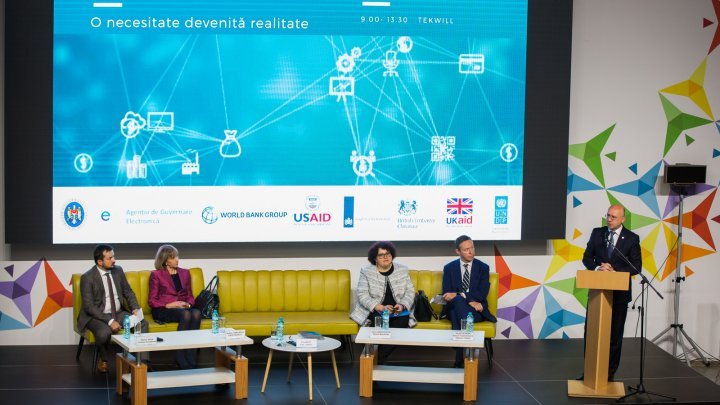Pavel Filip: Citizens will no longer have to file the criminal record with state institutions, and another 4 documents will be canceled
 foto: gov.md
foto: gov.md
Citizens will no longer have to file a criminal record with state institutions on October 8, and four other documents: medical insurance policy, medical certificate, entrepreneurial patent, and paperless state debt certificate will be canceled during near. This is what Premier Pavel Filip announced today in the event dedicated to the data exchange platform - MConnect.
Excluding documents on paper will save people's time, who will no longer have to go between institutions, but will also exempt them from the payments they pay for obtaining the papers.
"We have the necessary components to work online and all the conditions for the state institutions to no longer offer paper certificates. Today we all use electronic platforms, but in relation to the state, we have remained in the period of making postmen citizens. is to get into the situation when the citizens will no longer need certificates, but it will be enough to present only the identity card in relation to a state institution", said Pavel Filip.
The contraventional criminal record is no longer necessary when issuing driving licenses and issuing vehicle registration plates. As far as the insurance policy is concerned, the data of the persons are contained in the CNAM registers, for medical certificates the medical e-certificate platform is functional and for the certificate on the lack of state debts, all the information is public and available in electronic format.
Pavel Filip said that the list of canceled acts would be extended, and to provide affordable, citizen-centered services urged public institutions to be more insistent in using the MConnect platform. Today, over 30 institutions are connected to this platform, which performs real-time electronic data exchange.
The MConnect Platform is implemented by the Electronic Governance Agency to facilitate the electronic exchange of data between public authorities without requiring information from citizens and businesses in the form of certificates and reports. At the same time, it allows the creation of the necessary framework for the optimization and digitization of public services, but also the implementation of the one-stop shop principle.
Excluding documents on paper will save people's time, who will no longer have to go between institutions, but will also exempt them from the payments they pay for obtaining the papers.
"We have the necessary components to work online and all the conditions for the state institutions to no longer offer paper certificates. Today we all use electronic platforms, but in relation to the state, we have remained in the period of making postmen citizens. is to get into the situation when the citizens will no longer need certificates, but it will be enough to present only the identity card in relation to a state institution", said Pavel Filip.
The contraventional criminal record is no longer necessary when issuing driving licenses and issuing vehicle registration plates. As far as the insurance policy is concerned, the data of the persons are contained in the CNAM registers, for medical certificates the medical e-certificate platform is functional and for the certificate on the lack of state debts, all the information is public and available in electronic format.
Pavel Filip said that the list of canceled acts would be extended, and to provide affordable, citizen-centered services urged public institutions to be more insistent in using the MConnect platform. Today, over 30 institutions are connected to this platform, which performs real-time electronic data exchange.
The MConnect Platform is implemented by the Electronic Governance Agency to facilitate the electronic exchange of data between public authorities without requiring information from citizens and businesses in the form of certificates and reports. At the same time, it allows the creation of the necessary framework for the optimization and digitization of public services, but also the implementation of the one-stop shop principle.